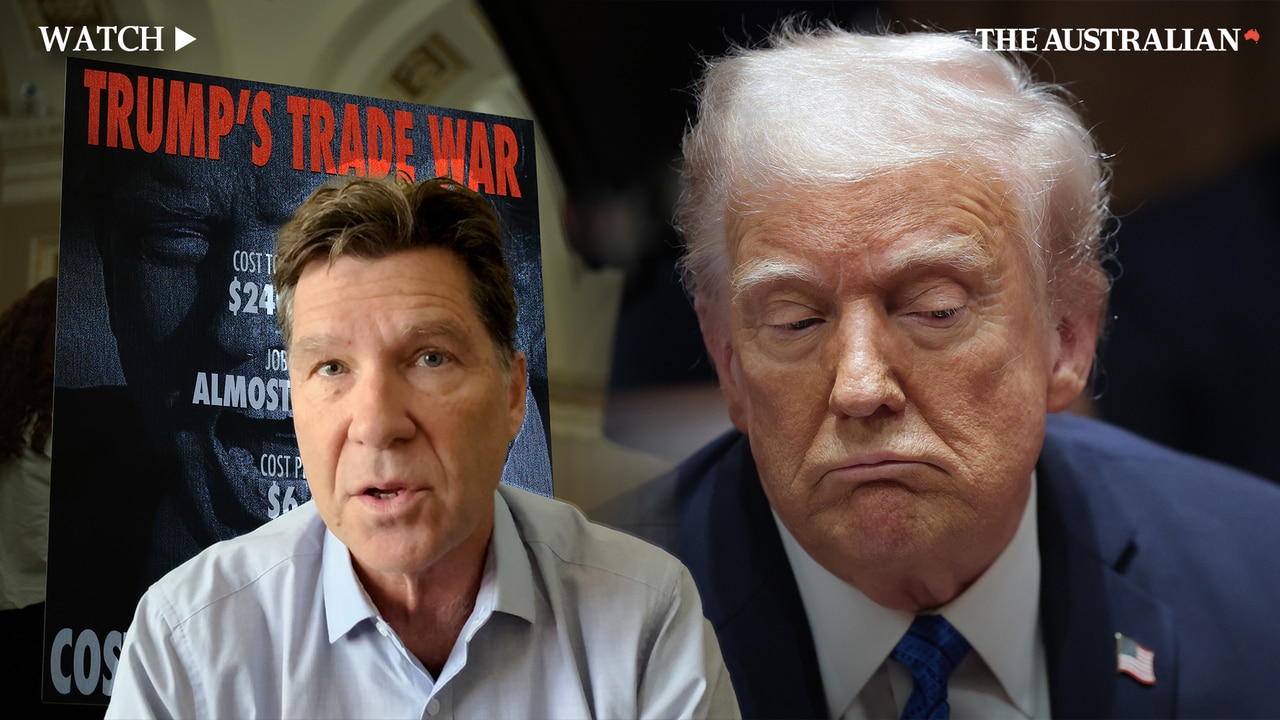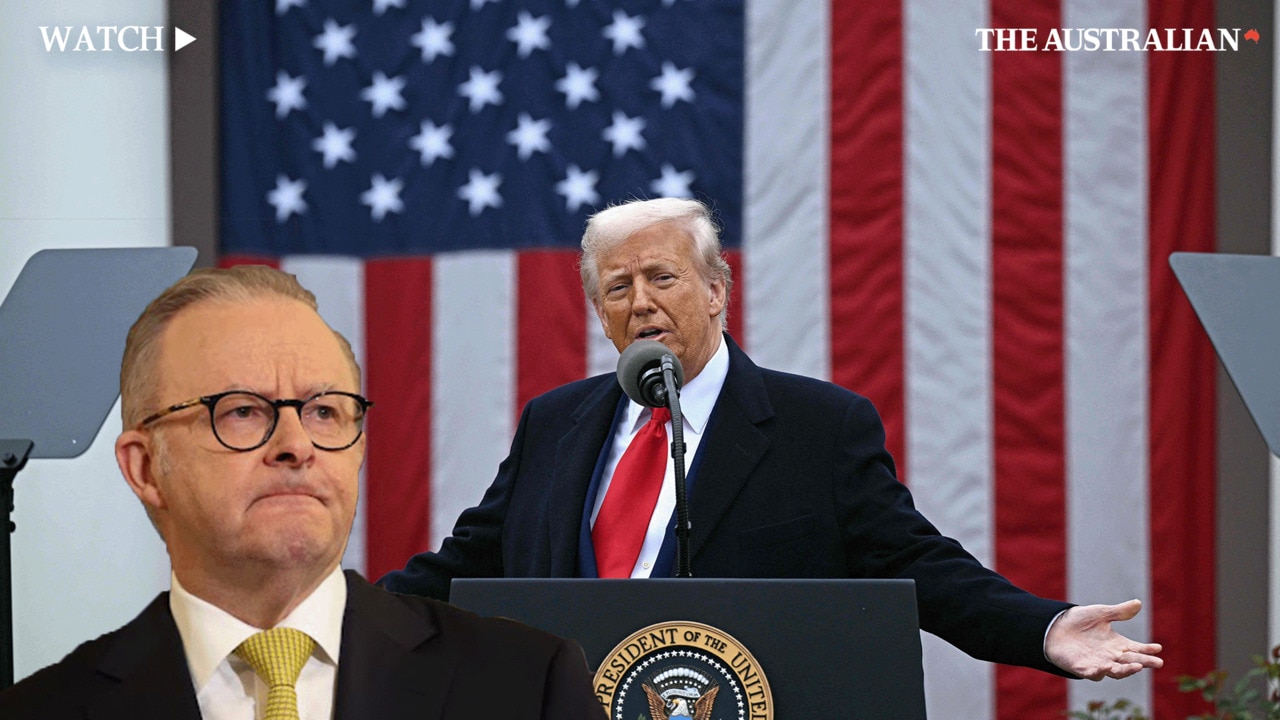Beijing threatens counterpunch after Donald Trump hikes tariffs on China to almost 70 per cent
After the cumulative tariff rate on Chinese imports were raised to almost 70pc, China’s response has stoked fears the Australian economy will be shaken by the worst trade war since the 1930s.

Beijing has threatened retaliation against America after Donald Trump hiked tariffs on China above 60 per cent, raising fears the Australian economy will be shaken by the worst international trade war since the 1930s.
The American President surprised Chinese policymakers with a sweeping new 34 per cent tariff, far higher than many in Beijing had expected.
Unlike for all other economies targeted by Trump, the new tariffs on China built on the 20 per cent tariffs he had already imposed on the world’s second biggest economy in his first months back in office.
They were further topped up by existing tariffs on China from Trump’s first term and added to by the Biden administration, which took the cumulative American tariff rate on Chinese imports to over 65 per cent.
Trump described his approach with China as “tough love”, as he lavished praise on the Chinese President Xi Jinping.
“I have great respect for President Xi of China, great respect for China,” Trump said in the Rose Garden. “But they were taking tremendous advantage.”
Compounding Beijing’s problems, the American president also signed a separate executive order that permanently ended a duty-free exemption on packages sent from China and Hong Kong valued below $US800 ($1270).
Chinese online retail giants Shein, a fast fashion chain, and PDD, an e-commerce firm, have used the loophole to fuel explosive growth in the American market and get around earlier American tariffs.
Trump linked that move, as he had with earlier China tariffs, to efforts to crack down on sources of fentanyl.

Hong Kong’s Hang Seng China Enterprises Index opened 2.6 per cent lower on Thursday. American giant Apple fell by more than 7 per cent, as investors worried about its China-exposed supply chain.
In the first comments by China’s government, Beijing’s Commerce Ministry on Thursday denounced America’s “unilateral bullying practice” and said it would take “resolute countermeasures”.
“There are no winners in a trade war, and there is no way out for protectionism. China urges the United States to immediately cancel its unilateral tariff measures and properly resolve differences with its trading partners through equal dialogue,” the Commerce Ministry said.
Speaking during a visit to Moscow days before Trump’s announcement, Xi’s top international adviser, Foreign Minister Wang Yi, said Beijing would not be pushed around.
“China has never accepted power politics and hegemony. If the US side insists on applying pressure or even continues with various forms of extortion, China will resolutely counteract,” Mr Wang said.
Beijing has responded to each of the Trump administration’s earlier 10 per cent tariff hikes with targeted strikes, mostly on American agriculture. That has created some opportunities in the China market for Australian farmers and other agricultural exporters.
Speaking after Trump’s Rose Garden announcement, US Treasury Secretary Scott Bessent warned that any countries who retaliated would face even higher levels.
“As long as you don’t retaliate, this is the high end of the number,” Mr Bessent said.
Unlike the universal 10 per cent tariff Trump is imposing this weekend on Australian and other countries, the China tariffs will not begin until next week, giving a short period of time for Beijing to try to get Washington to soften them.
Economists have forecast that the Australian economy will feel the impact of any tariff-induced slowdown to the Chinese economy.
That impact may be softened if Beijing responds with increased economic stimulus, although rising debt levels limit the Chinese government’s options.
Australia’s other biggest trade partners, Japan, South Korea, Taiwan and India, were also hit with American tariffs ranging from 24 to 32 per cent.
Shiro Armstrong, director of the ANU’s East Asian Bureau of Economic Research, said Trump had targeted Asia more than any other region.

Dr Armstrong said while the temptation will be to retaliate, that would risk more damage and threaten the entire trading system Australia and other countries rely on.
“What’s needed is collective action, not against the United States but to save the furniture of the global trading system,” he told The Australian.
Chinese public opinion, and President Xi’s nationalist instincts, mean retaliation from Beijing is widely seen as inevitable.
“If Trump’s prior 20 per cent tariff hikes took a hammer to US-China trade, today’s actions are a bazooka,” said Jennifer Welch, chief geoeconomics analyst for Bloomberg Economics.
Julian Evans-Pritchard, head of China at Capital Economics, forecast China’s growth rate would likely fall by towards 1 per cent after the tariffs, which he said were “higher than we had anticipated”.
Policy makers in Beijing have spent weeks before the announcement preparing options for China’s leader. The extent of Trump’s assault may see Xi reach for extreme options as he responds.
Factory owners in China, who in Trump’s first term were able to move production to South East Asia to evade American sanctions, said that option was over after the region was also badly hit by the new wave of tariffs.
However, moving to America would still not make commercial sense, one factory owner in China’s southern province of Guangdong told The Australian. “The production cost there is too high,” he said, citing American labour costs.
The factory owner said many of his peers were despairing at the outlook. “People are full of grievances here.”




To join the conversation, please log in. Don't have an account? Register
Join the conversation, you are commenting as Logout